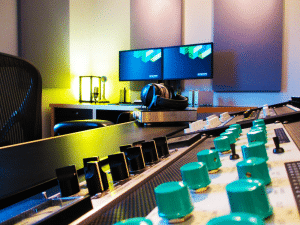The Future of Digital Audio Quality
Back in 2006, legendary guitarist Ry Cooder was working on the solo album that would eventually become “My Name Is Buddy,” but he couldn’t quite get the sound right.
“It started to sound processed, we were losing the feeling of the thing,” he told the New York Times around that time. But then he burned a copy of the album in iTunes, which had the “sound enhancer” feature enabled. Cooder told the paper he was so impressed with what the “enhancer” did to the sound that he didn’t do anything else to the final sound mixes of the songs.
But that album was something of an anomaly – in fact, most CD mastering engineers today are attempting to work around what iTunes does to the sound of the final version of songs, or at least take what it does into account for final mixes.
The question is, will CD mastering services begin producing separate mixes specifically for digital release? It seems that this is what Apple is betting on.

Mastered for iTunes
Most music listeners are by now familiar with the compressed, digital versions of music files that are sold by digital music retailers – some use the MP3 format, though Apple opted to make the Advanced Audio Coding (AAC) format it’s standard. Both use algorithms that attempt to “smartly” discard sound information from the original, lossless music file that the average listener (theoretically) won’t miss. And recently, Apple has changed things up again.
Perhaps in response to pressure from audiophiles everywhere – represented by outspoken notables in the industry like Neil Young, Dr. Dre and label exec Jimmy Iovine – Apple recently premiered iTunes Plus tracks, which use the same 16-bit 44.1 kHz resolution found on CDs. But even that rate only contains around 15 percent of the original information recorded (assuming the recording was made at 24-bit 192 kHz).
Shortly after debuting the iTunes Plus tracks, Apple posted a document on its website titled, “Mastered for iTunes: Music as the Artist and Sound Engineer Intended.” After detailing a short history of the compressed audio file, Apple admits that, “An inherent challenge of working with high resolution audio has been that both the sample rate and the bit depth must be reduced to match the specifications used in mainstream distribution, such as CD or AAC.” The document then goes on to present a list of “Best Practices for Mastering for iTunes.”
Influence on the Industry
Just how this new statement from Apple will affect the CD mastering industry – if it does at all – remains to be seen. The influence comes from the fact that Apple is not only the largest digital music retailer in the world, but also the largest overall music retailer in the world, period. And the recording industry is taking notice.
Earlier this month, a press release announced that Bob Ludwig, president of Gateway Mastering, will lead a panel called “Mastering Apple Inc.’s ‘Mastered for iTunes’ Initiative – the Science, the Procedures and the Results” at this year’s upcoming 133rd Audio Engineering Society (AES) convention in San Francisco. The release points out that the “Mastered for iTunes initiative [is] one of the most significant, yet misunderstood innovations developed for the ubiquitous music distribution format.”
Catering to Different Audio Formats
The CD mastering industry – and indeed the recording industry as a whole – is by no means a stranger to producing different mixes depending on the distribution medium. For example, a master destined for a vinyl record is certainly treated differently than one that will likely only be played at a loud club. But whether or not catering mastering mixes for digital release becomes a trend is not really the main issue here. No, the overarching point is that we are in the middle of the digital revolution, and it’s going to be an exciting ride as we watch where it all goes from here.

What Lies Beyond
As computer power increases along with hard disk space and download speeds, the possibility for much higher resolution digital music files will become more of a possibility than ever before. I know quite a few CD mastering engineers that would rejoice if digital music listeners begin hearing files that are higher quality than all those old CDs we’re currently in the process of throwing out.
But the fact remains that the entire music industry is in a transitional phase at this point, and we’ll have to wait to see what will happen in terms of audio quality. Hopefully the quality of digital files will continue to improve as technology allows it. An even more optimistic desire would be that digital music listeners begin to care about that high quality.




